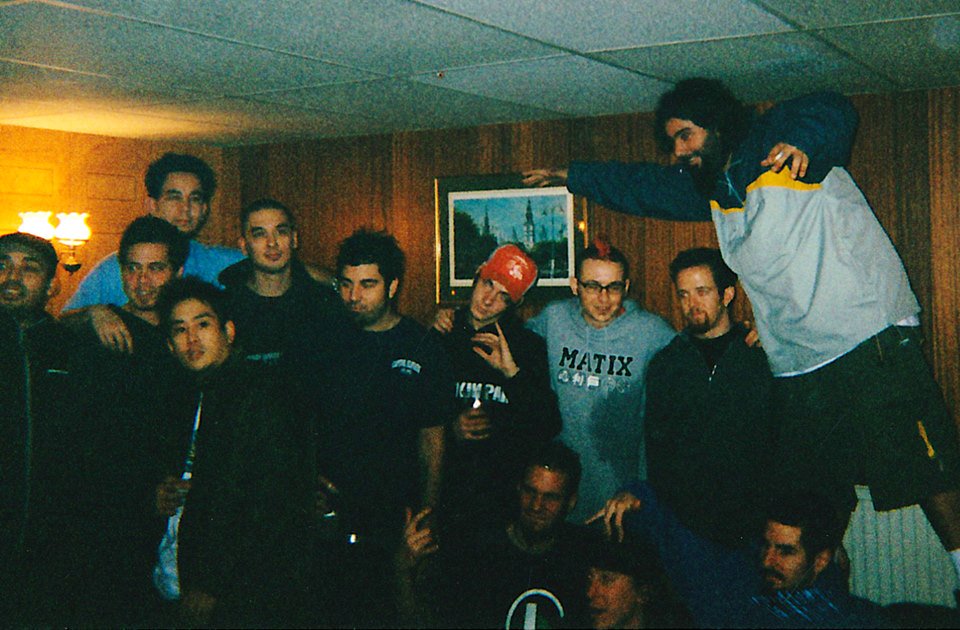There’s many reasons for the continued popularity of nu-metal over the years. Arriving at a time where social media was in its (very) early infancy, the Internet was becoming a powerful tool for communication and promotion, and CD sales reached their highest peak in 2000 (consequently, right around the time Napster was formed and peer-to-peer file sharing started becoming more accessible). Between 1994, which many say was the start of the genre with Korn’s self-titled debut album, and 2003, where oversaturation and changing tastes (metalcore, baby!) caused many nu-metal bands to change their style or even break up, the genre enjoyed its most notable time in the spotlight.
VOID ETERNAL https://t.co/uFyHKo9I10
— NOTHINGNOWHERE (@nothingnowhere) April 24, 2023
It would be silly to think it died completely, though. After all, Linkin Park still topped the charts with 2007’s Minutes To Midnight (albeit by leaving much of their previous sound behind), while Slipknot continued to enjoy massive success with 2004’s Vol. 3: The Subliminal Verses. P.O.D. was still experiencing success with their self-titled album and a huge song on the Matrix: Reloaded soundtrack (“Sleeping Awake”), and System Of A Down continued to grow massively with their Hypnotize // Mezmerize albums – though they did take a musical departure into more of an alternative metal sound. And then you had bands like Sevendust that, while they combined other styles of rock, metal, and soul in their music, were often pigeonholed in the genre. Yet, they still managed to gain a bigger fanbase on albums like Seasons, Next, and Alpha – with sometimes much heavier results.
Is nu-metal officially back?
Online interest in the genre is now at its highest level since 2004 https://t.co/lakcuFRwgt
shoutout to @numetal_moment pic.twitter.com/qvjyoh0LrF
— Rock Sound (@rocksound) April 24, 2023
It is true, of course, that many bands suffered a decline in popularity (and especially album sales). The latter was due in large part to the rise of the aforementioned file sharing services (Napster, also Limewire, Frostwire, Bearshare, and plenty of other niche ones that 2000s kids will definitely remember), but also simply because of changing tastes and more accessibility. You had bands like Finch, The Used, My Chemical Romance, and tons of post-hardcore, metalcore, emo, and even indie rock bands emerging as competitors of sorts. There was a time where many FM rock radio stations, who once played post-grunge and nu-metal bands constantly, quickly shifted to playing White Stripes and The Strokes songs on repeat.
For the tenth week in a row, #Lost remains at the top of #RockandAlternativeAirplay and #HotHardRockSongs.
○#LinkinPark #Meteora #Meteora20 #MakeChesterProud pic.twitter.com/UFVtYWRaFT— Linkin Park Billboard (@linkinparkbb) April 25, 2023
The fact is, though, nu-metal never completely went away. The success of Linkin Park’s Hybrid Theory and Meteora 20th anniversary editions are but two sets of proof, with Linkin Park’s “Lost” still topping the rock charts as we speak. There’s also the fact that so many newer bands are inviting elements of the genre into their own music. Bands like Moodring, Cane Hill, Tallah, Vein.fm, Graphic Nature, Blood Youth (hope they come back someday!), Narrow Head, Dropout Kings, From Ashes To New, and so many more are helping the genre explode yet again. That’s also a big reason why the genre is still continuing to have relevance – it’s one of the most truly multicultural forms of music out there. And the thing is, these bands are mixing shoegaze, grunge, alt-metal, hip-hop, metalcore, drum ‘n’ bass, alt-rock, pop, and so many more influences into their music in a truly exciting way. You know, kinda how nu-metal exploded in the first place. Whether or not they’re actually nu-metal is another conversation entirely (Narrow Head definitely isn’t), but they’re close enough to the genre that it’s comforting and familiar, yet still exciting.
And then you have groundbreakers like nothing,nowhere. who just throw the kitchen sink at you and explore new avenues with every album. In particular, the new n,n. album explores nu-metal, post-hardcore, emo, hip-hop, and many other genres in a way that’s almost a love letter to those genres. So many features, and none of them manage to sound phoned in or too far gone.
Billboard Magazine's Modern Rock and Mainstream Rock Top 40 for the week ending April 26th, 2003 pic.twitter.com/L1xMgW6NEr
— crazy ass moments in nu metal history (@numetal_moment) April 24, 2023
If it wasn’t clear, nu-metal is here to stay (lol). Just like most forms of art, musical genres tend to be cyclical in nature – but considering the fact that it’s still as popular as it was 20 years ago, there’s certainly room for a new generation of bands to take over. In fact, it’s already happening.
According to Google Trends interest in nu metal has now exceeded its previous peak in 2004, when Google began tracking pic.twitter.com/85vLtRsfHC
— crazy ass moments in nu metal history (@numetal_moment) April 23, 2023





More Stories
New Hampshire metalcore band In Shallows ignites with reflective anthem “World Fire”
Hot grindcore act Poolside At The Flamingo drops super heavy new track “Seething”
Indie rockers The Babies to reunite for 2 shows this fall, bands first shows since 2013